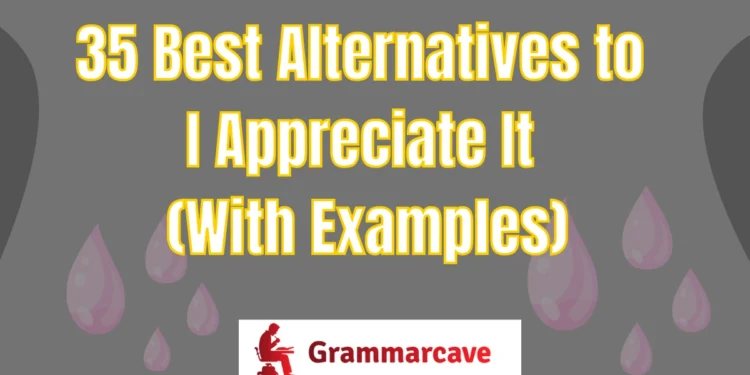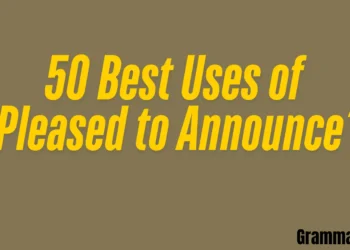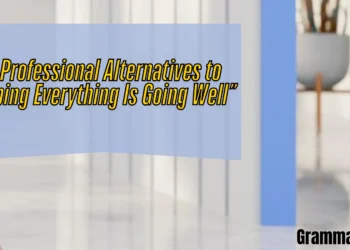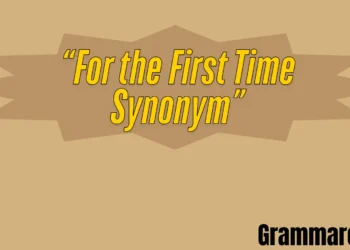Appreciating someone’s help or the trust a client has put in you goes far beyond “thank you.” When done correctly, expressing gratitude strengthens working relationships and greatly improves collaboration.
Turning gratitude into nuanced appreciation makes your appreciation more impactful in communication. Here are 35 alternatives to “I appreciate” that work best for spouses, workplaces, formal acknowledgment, and rapport-building communications.
What Does“I Appreciate It” Mean?
I appreciate that it is one of the most used phrases for showing appreciation and thanking someone. It goes beyond simply saying “Thank you,” as it captures the value, effort, and thought behind a person’s action, gift, or words. ‘It”, in that phrase, refers to whatever the person did or offered. In its simplest form, it means “Thank you, and I acknowledge what you did or offered and especially the effort or thought put in.”
Is It Professional/Polite to Say“I Appreciate It”?
Surely, “I appreciate it” is professional and polite. It is also culturally accepted in emails and at the office when a person aids you or finishes a given task. In the most formal of cases, a “Thank you for your assistance” or “I am grateful for your support” could be offered, but “I appreciate it” is still perfectly courteous. Make sure you offer appreciation alongside sincerity to maintain professionalism.
Advantages and Disadvantages of Saying“I Appreciate It”
Advantages
- Conveys Sincere Gratitude: It appropriately thanks and clarifies that appreciation is offered based on aid or assistance.
- Widely Professional & Polite: This phrase protects the level of decorum and courtesy in any official or formal setting, so it can be used without fear of offending manners in any professional communication.
- Versatile & Concise: This statement requires little time to frame and deliver, making it suitable for use in many different situations, such as email, chat, or face-to-face conversations.
- Acknowledges Value: This statement recognizes that the provided action was helpful or that the offered items had relevance.
Disadvantages
- Can Be Vague: Without context, “it” might be unclear what specifically is being appreciated.
- Risk of Impersonality: If overused or delivered flatly, it can sound automatic or transactional rather than heartfelt.
- May Feel Slightly Informal: In extremely formal contexts (e.g., high-level legal correspondence), alternatives like “Thank you for your assistance” might be preferred.
- Potential for Dilution: Frequent use without variation can lessen its perceived sincerity or impact over time.
What tone does it carry,“I Appreciate It”?
“I appreciate it” is polite, respectful, and sincere, balancing warmth with professionalism. It feels moderately formal yet approachable, emphasizing recognition of value over casual thanks. Its authenticity, however, hinges on context and delivery—it can sound detached if rushed or deeply genuine when heartfelt.
When should you avoid using the phrase“I appreciate it”?
- Avoid saying “I appreciate it” when making significant sacrifices or receiving deeply personal favors—opt for heartfelt, specific thanks instead.
- Avoid formal ceremonies or professional awards where elevated, gracious language is expected.
- Avoid high-enthusiasm cultures or contexts that demand phrases like “Thank you so much!”
- Avoid if overused, as repetition drains sincerity—rotate with warmer or more vivid alternatives.
Professional Alternatives to“I appreciate it.”
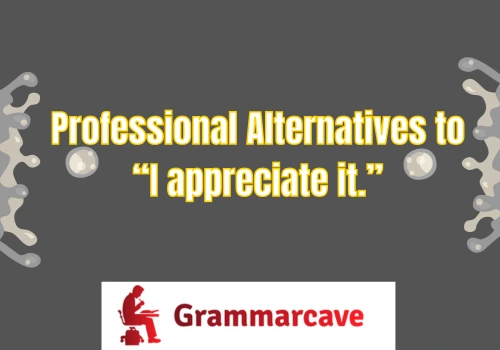
1. Your efforts are highly valued.
Meaning: Official recognition of hard work.
Definition: Often used in leadership or teamwork to validate contributions.
Explanation: Highlights that their work isn’t just noticed—it’s essential.
Example: “The entire team highly values your efforts on this project.”
Best for: Workplace recognition performance reviews.
Worst for Informal settings (sounds corporate).
Tone: Professional, appreciative, authoritative.
2. I acknowledge your contribution.
Meaning: A formal way to credit someone’s input.
Definition: Common in collaborative or academic settings.
Explanation: Highlights balance by offering credit where credit is due.
Example: “Your insights were essential; I thank your contribution to the research.”
Best for: Group projects, academic papers, formal reports.
Worst for: Thanking a friend for a gift (too transactional).
Tone: Neutral, respectful, slightly detached.
3. Many thanks for your diligence
Meaning: Appreciation for meticulous effort.
Definition: Praise someone’s attention to detail.
Explanation: Perfect when someone goes above and beyond.
Example: “Many thanks for your diligence in proofreading—you caught errors I’d missed.”
Best for: Work tasks, academic help, detailed favors.
Worst for: Quick, casual help (e.g., holding a door).
Tone: Professional, appreciative, slightly old-fashioned.
4. This is greatly appreciated.
Meaning: A sincere way to emphasize how much you value something.
Definition: Stresses that the action had a significant positive impact.
Explanation: Showing a more profound joy is more potent than a simple thank you.
Example: “You covering my last-minute shift is greatly appreciated—it saved me!”
Best for: When someone goes out of their way to help you.
Worst for: Routine, expected tasks (sounds overly formal).
Tone: Grateful, warm, slightly formal.
5. Your input is invaluable.
Meaning: Their advice/contribution was uniquely important.
Definition: Suggests their perspective couldn’t be replaced.
Explanation: Perfect when someone’s expertise makes a real difference.
Example: “Your input on the design was invaluable—we used all your suggestions!”
Best for: Professional collaborations and creative projects.
Worst for: Casual opinions (e.g., “Which shirt looks better?”).
Tone: Professional yet personal, admiring.
6. Your work is commendable
Meaning: Formal praise for a job well done.
Definition: Often used by managers/supervisors.
Explanation: Recognizes quality and effort professionally.
Example: “Your work on the campaign was commendable—the client loved it.”
Best for: Workplace recognition, performance feedback.
Worst for: Personal relationships (too stiff).
Tone: Professional, praising.
7. My sincere gratitude.
Meaning: A heartfelt, polished thank-you.
Definition: More formal but deeply genuine.
Explanation: Works well in writing (cards, emails).
Example: Thank you for mentoring me this year.
Best for Formal thank-you notes and professional relationships.
Worst for: Texting a friend (too stuffy).
Tone: Elegant, heartfelt.
8. Thank you for your expertise.
Meaning: Specifically thanks to their specialized knowledge.
Definition: Acknowledges their professional skill.
Example: Thank you for your expertise in fixing this coding error so quickly!
Best for: When someone’s professional skills helped you.
Worst for: General help (e.g., lending a pen).
Tone: Respectful, admiring.
9. This means so much to me
Meaning: Emotional appreciation for meaningful support.
Definition: Shows the action had personal significance.
Example: “You listening to me vent last night means so much.
Best for: Deep friendships and emotional moments.
Worst for Transactional or professional help.
Tone: Vulnerable, heartfelt.
10. You made my day!
Meaning: A cheerful way to say someone’s action brought you joy.
Definition: Indicates that their gesture significantly improved your mood/day.
Explanation: Lighthearted yet appreciative, often used for small but meaningful acts.
Example: You brought me coffee? You made my day!
Best for: Casual, friendly, or workplace positivity.
Worst for: Somber situations (may seem dismissive).
Tone: Playful, upbeat, grateful.
11. I’m genuinely grateful
Meaning: A sincere, polished way to express deep thanks.
Definition: “Truly” emphasizes genuine appreciation.
Explanation: Works in personal and professional settings, carrying weight without being overly emotional.
Example: I’m genuinely grateful for your guidance this year.
Best for Formal emails, mentors, or meaningful support.
Worst for: Sarcasm or trivial favors (can sound insincere if misused).
Tone: Honest, respectful, warm.
12. I owe you one!
Meaning: Playful gratitude with a promise of future payback.
Definition: It means you will soon repeat the favor.
Explanation: Friendly and pleasant, often used with colleagues.
Example: “You covered my shift? I owe you one!”
Best for: Informal, reciprocal relationships.
Worst for: Serious or formal gratitude (may seem flippant).
Tone: Lighthearted, indebted, friendly.
13. How thoughtful of you!
Meaning: Appreciation for someone’s considerate action.
Definition: Recognizes the effort and care behind the gesture.
Explanation: Perfect for when someone remembers small details or goes out of their way.
Example: You brought soup when I was sick? How thoughtful of you!
Best for: Personal or close professional relationships.
Worst for: Impersonal or rushed exchanges.
Tone: Sweet, appreciative, surprised.
14. Thanks!
Meaning: Simple, universal gratitude.
Definition: A quick, polite acknowledgment.
Explanation: Versatile but can feel minimal; tone depends on delivery.
Example: Thanks for grabbing the mail!
Best for: everyday, low-stakes situations.
Worst for: Big favors or emotional moments (may seem dismissive).
Tone: Neutral, casual, polite.
15. Bravo—and thank you!
Meaning: Well done, and I’m grateful.
Definition: Combines applause with gratitude.
Explanation: The “bravo” adds a performative flair (from Italian for excellent).
Example: Bravo—and thank you! That was the best presentation I’ve seen.
Best for: Artistic or public achievements.
Worst for: Quiet, private help (e.g., “You listened to my rant? Bravo!”).
Tone: Celebratory, slightly formal.
16. Awesome—thanks!
Meaning: Excited, modern gratitude.
Definition: Mixes praise (“awesome”) with thanks.
Explanation: Great for casual, upbeat interactions.
Example: You fixed my laptop? Awesome—thanks!
Best for: Friends, peers, or informal exchanges.
Worst for: Serious or professional decorum.
Tone: Enthusiastic, youthful, grateful.
17. You rock!
Meaning: Playful, high-energy praise + thanks.
Definition: Compliments the person’s awesomeness.
Explanation: Fun and informal, best for close relationships.
Example: You got us concert tickets? You rock!
It is best for Friends, family, or relaxed environments.
Worst for: Formal settings or older audiences (may seem immature).
Tone: Energetic, affectionate, casual.
18. Got it—thanks!
Meaning: Acknowledges receipt while expressing brief gratitude.
Definition: Efficient communication combining confirmation and appreciation.
Explanation: This is the perfect email or message closer when you want to confirm you’ve received something while keeping the exchange brief but polite.
Example: The files came through—got it, thanks! I’ll review them this afternoon.
Best for: Work communications where efficiency is valued.
Worst for: Situations requiring more elaborate thanks or emotional acknowledgment.
Tone: Professional, concise, appreciative.
19. This saved me so much time
Meaning: Expresses how someone’s action had tangible, practical benefits for you.
Definition: Gratitude that quantifies the impact of their help.
Explanation: People often underestimate the value of time savings. This phrase makes that benefit explicit, making your thanks more meaningful.
Example: You formatting those documents saved me so much time—I appreciate it!
Best for: Workplace situations where efficiency matters.
Worst for: Emotional support situations where practical impact isn’t the focus.
Tone: Grateful, practical, slightly relieved.
20. You’re a gem!
Meaning: You’re rare and wonderful.
Definition: A sweet, informal compliment comparing someone to a jewel.
Explanation: Gender-neutral and endearing. Great for friends or colleagues.
Example: You covered my shift at the last minute? You’re a gem!
Best for: Everyday kindness, friends, coworkers.
This is the worst for Formal settings (e.g., a CEO: “Your merger deal was stellar—you’re a gem!”).
Tone: Affectionate, playful, glowing.
21. This solution is brilliant—thank you!
Meaning: Expresses enthusiastic appreciation for an especially clever fix.
Definition: Gratitude that praises explicitly the intelligence of the solution.
Explanation: The word “brilliant” elevates this thanks, making it particularly meaningful when someone has solved a complex problem.
Example: This workaround for the software bug is brilliant—thank you! You saved the project timeline.
Best for: Technical or creative problem-solving scenarios.
Worst for: Routine or simple tasks.
Tone: Enthusiastic, impressed, grateful.
22. This was precisely what I needed.
Meaning: Shows perfect alignment between their help and your requirements.
Definition: Gratitude that emphasizes how precisely something met your needs.
Explanation: This expression validates that someone understood your needs perfectly and delivered accordingly.
Example: The research summary you prepared was exactly what I needed for my presentation – you nailed all the key points.
Best for: Professional collaborations.
Worst for: Situations where the help was generic rather than tailored.
Tone: Satisfied, grateful, pleasantly surprised.
23. Your insight clarified everything.
Meaning: Acknowledges how someone’s perspective resolved confusion.
Definition: Thanks, which specifically values intellectual contribution.
Explanation: This is powerful in professional settings because it recognizes someone’s expertise in understanding complex things.
Example: Your insight into the market trends clarified everything—I finally understand where we should focus our efforts.
Best for: Mentorship, consulting.
Worst for: Simple favors that didn’t require explanation.
Tone: Respectful, admiring, intellectually grateful.
24. You made magic happen!
Meaning: “You achieved the impossible!”
Definition: Colorful praise for extraordinary results.
Explanation: Implies creativity, effort, and awe. Popular in creative fields.
Example: “The event was a disaster until you stepped in—you made magic happen!
Best for: Creative saves, huge wins.
Worst for: Mundane tasks (e.g., “You filed the taxes? Magic!”).
Tone: Enthusiastic, amazed.
25. Wow, I’m speechless!
Meaning: Shows the help was so great it left you without words.
Definition: Grateful expression of pleasant shock.
Explanation: Recognizing that their behavior overwhelmed you creates an insecure moment (in a positive way).
Example: “Wow, I’m speechless! The entire team pitched in to complete my work while I was sick.
Best for: Grand gestures or unexpected kindness.
Worst for: Small, everyday favors.
Tone: Astonished, touched, emotionally open.
26. A massive thank you!
Meaning: Amplified version of standard thanks.
Definition: Enthusiastic, British-influenced expression.
Explanation: “Massive” adds physical scale to gratitude, making it feel substantial. The phrasing is particularly common in UK English but works universally.
Example: “A massive thank you for organizing the surprise party – you kept it secret for weeks!
Best for: Significant efforts or successful surprises.
Worst for: Minor, routine help.
Tone: Warm, enthusiastic, appreciative.
27. stellar—thanks!
Meaning: Astronomical praise combined with gratitude.
Definition: Vivid metaphor emphasizing exceptional quality.
Explanation: “Stellar” suggests their help was out-of-this-world good. The dash makes the thanks feel immediate and excited.
Example: “Your presentation was stellar—thanks for representing our team so well!”
Best for: Outstanding professional work or creative efforts.
Worst for: Everyday, average assistance.
Tone: Enthusiastic, complimentary.
28. This blew me away!
Meaning: The help was so good it metaphorically knocked you over.
Definition: Vibrant expression of astonished gratitude.
Explanation: This visceral metaphor suggests the help had a physical impact, making your thanks feel more immediate and genuine.
Example: Your birthday video blew me away! How did you get messages from all my old friends?
Best for: Extraordinary gestures or creative surprises.
Worst for: Routine or practical help.
Tone: Amazed, touched, exuberant.
29. Your support humbles me.
Meaning: Your help made me feel modest or undeserving.
Definition: Acknowledges that the support has reduced the recipient’s ego or pride.
Explanation: Often used in professional or communal achievements (awards, projects). This implies you don’t take the support for granted.
Example: Seeing 500 people attend my book launch—your support humbles me.
Best for: Public thank-yous, milestones, or team efforts.
Worst for: Routine help (e.g., “You proofread my email? I’m humbled!” sounds odd).
Tone: Respectful, reflective, gracious.
30. Deeply obliged
Meaning: “I owe you one” in a formal, old-school way.
Definition: Conveys a sense of debt or duty toward the giver.
Explanation: Common in written notes or formal settings. It can feel stiff if overused.
Example: For your mentorship this year, I’m deeply obliged.
It is best for Formal emails, thanking superiors, or historical reenactments (lol).
Worst for: Casual chats (e.g., “You passed the salt? Deeply obliged.”).
Tone: Polite, traditional, slightly solemn.
31. With utmost appreciation.
Meaning: The highest, most sincere level of thanks.
Definition: A polished way to express maximum gratitude.
Explanation: It adds gravitas and is ideal for cover letters, awards, or thanking someone who went above and beyond.
Example: With utmost appreciation, I accept this scholarship. Your belief in me changes everything.
Best for Professional or ceremonial contexts.
Worst for: Minor favors (e.g., texting a friend: “Utmost appreciation for the meme”).
Tone: Formal, dignified, heartfelt.
32. Mission accomplished—thanks to you!
Meaning: “We succeeded because of you.”
Definition: Team-centric gratitude highlighting collaboration.
Explanation: “Mission” adds a playful, goal-oriented vibe.
Example: “The client signed the contract! Mission accomplished—thanks to you!”
Best for: Group efforts, workplace wins.
Worst for: Solo achievements (e.g., “You tied your shoes? Mission accomplished!”).
Tone: Triumphant, grateful, team-spirited.
33. My thanks are profound
Meaning: “I’m not just thanking you—I’m feeling it deeply.
Definition: A formal yet emotional way to express bottomless gratitude.
Explanation: “Profound” adds a philosophical, almost spiritual layer.
Example: “For saving my business, my thanks are profound.
Best for: Lifesaving help, significant mentorship.
It is worse for Everyday interactions (e.g., “You held the door? My thanks are profound.”).
Tone: Grateful, intense, almost poetic.
34. Respectfully, thank you
Meaning: I thank you with high regard.
Definition: A dignified, slightly distanced way to show gratitude.
Explanation: The “respectfully” adds a bow-like formality. Common in military or hierarchical settings.
Example: Respectfully, thank you for your service, Captain.
Best for Authorities, elders, or strict professional environments.
Worst for: Friends (e.g., “Respectfully, thanks for the taco”).
Tone: Formal, deferential, rigid.
35. You’ve earned my eternal gratitude!
Meaning: I’ll be thankful to you forever.
Definition: Dramatic but sincere—for when someone changes your life.
Explanation: “Eternal” raises the stakes; use sparingly for maximum impact.
Example: You adopted my rescue dog when I couldn’t keep him? You’ve earned my eternal gratitude!
Best for: Lifelong debts (saving a life, significant sacrifices).
Worst for: Temporary help (e.g., “You watered my plants? Eternal gratitude!”).
Tone: Passionate, emphatic, grand.
FAQS
- What does “I appreciate it” mean?
Answer: “I appreciate it” is a phrase used to express gratitude and recognition for something someone has done for you. It suggests you value both the action and the person who did it.
- When should I use “I appreciate it” instead of “thank you”?
Answer: Use “I appreciate it” to emphasize that you value the specific effort or action rather than just acknowledging it. “Thank you” is more general, while “I appreciate it” feels more personal.
- How do I say “I appreciate it” for a gift or favor?
Answer: For gifts: “I appreciate this so much – you know my taste!” For favors: “I appreciate you going out of your way to help me with this.”
- Is “I appreciate it” too formal for texting?
Answer: Not at all! You can make it casual: “Appreciate you!” or “TYSM – I appreciate it!” works well in texts.
Conclusion
As I see it, the phrase “I appreciate it” is one of the most recognized expressions of gratitude in every personal, professional, and casual context, owing to its short, warm, and polite nature. In some cases, it is over-relying, seeing how widely accepted it is; its appeal decreases if one comes off as vague or tries to put too much emotion into it. Instead, try using it along with measurable accomplishments or give it a twist – “I appreciate your quick resolving of the issue shouts” or suffices much more. Yet, there is no denying that the phrase is handy in almost every situation when one needs to acknowledge someone’s goodwill accompanied by effort; however, as with all forms of gratitude, sincerity, and genuine care truly unlock any form of appreciation, whether big or small, structured, or spontaneous.

